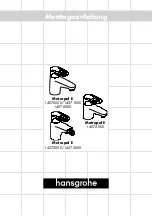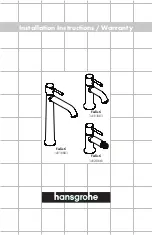
9. Complete the Installation
Apply silicone sealant to the upper portion of the nailing-in flange/vinyl bead where it will meet
the water-resistant wall material.
Cover the framing, walls and nailing-in flange with water-resistant wall material.
Install the water-resistant wall material to the framing with the paperbound edge a maximum of
1/4
″
(6 mm) above the finished concave surface of the receptor.
Tape and mud the wall material.
Install the finished wall. Seal the joints between the receptor rim and the finished wall with silicone
sealant. RTV (Room Temperature Vulcanizing) sealant is recommended.
Seal around the valving and outlets with silicone sealant or plumbers putty.
Install the faucet and drain trim according to the manufacturer’s instructions.
If used, install the grab bars or towel bars to the backing in the stud wall (previously installed).
Follow the manufacturer’s installation instructions.
If used, install the shower door according to the manufacturer’s instructions.
Install the finished floor. Apply silicone sealant along the front edge of the receptor where it meets
the floor.
10. Clean-Up
CAUTION: Risk of product damage.
Do not allow cleaners containing petroleum distillates to remain
in contact with module surfaces for any length of time.
CAUTION: Risk of product damage.
Do not use abrasive cleaners.
When cleaning up after installation, use warm water and an approved liquid cleanser to clean the
surface.
Stubborn stains, paint or tar can be removed with turpentine or paint thinner.
Plaster can be removed by scraping with a wood edge. Do not use metal scrapers, wire brushes, or
other metal tools. Use warm water and an approved liquid cleanser to provide mild abrasive action
to remove residual plaster.
1/2" (1.3 cm)
Water-Resistant
Wall Material
Edge
(Paperboard)
Down
Concave Surface
1/4" (6 mm)
2x4 Framing
1/8" (3 mm)
Furring
Galvanized
Nail
Water-Resistant Sealer Between Nailing-in Flange And
Paperbound Edge Of Water-Resistant Wall Material
Kohler Co.
11
1030520-2-B












































